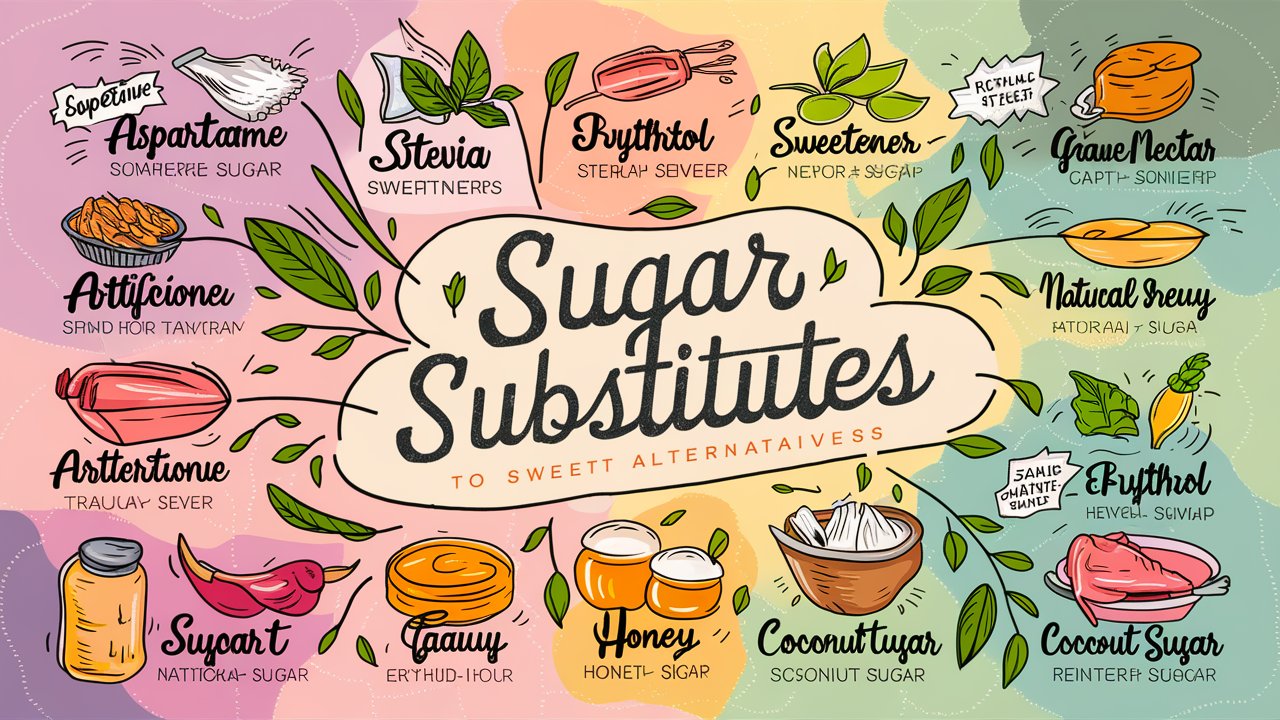
Table of Contents
In the weight management arena, sugar substitutes dominate supermarket shelves. From tabletop sweeteners to sugar-free beverages, these products entice us with the promise of sweetness without the calories. But are sugar substitutes truly a magic bullet for weight loss? This blog post dives into the science behind sugar substitutes, exploring their safety, effectiveness, and potential role in a healthy weight management strategy.
Understanding Sugar Substitutes: A Diverse Bunch
Sugar alternative encompass a wide range of artificial and natural sweeteners. Here’s a breakdown of some common types:
- Artificial Sweeteners: Lab-created sweeteners, often many times sweeter than sugar. Examples include aspartame, sucralose (Splenda), saccharin, and acesulfame K (Acesulfame).
- Sugar Alcohols: Naturally occurring or man-made sugar alcohols with a lower calorie content than sugar. Examples include sorbitol, xylitol, and erythritol.
- Natural Sweeteners: Some natural ingredients offer sweetness with lower calorie content compared to sugar. Examples include stevia, monk fruit sweetener, and allulose.
The Sweet Science: How Sugar Substitutes Work
Sugar alternative interact with our taste buds differently than sugar. Artificial sweeteners bind to taste receptors on the tongue, triggering a perception of sweetness without actually providing calories. Sugar alcohols have a slightly different mechanism. They are partially absorbed by the body, leading to fewer calories compared to sugar. Natural sweeteners like stevia and monk fruit contain compounds hundreds of times sweeter than sugar, requiring minimal amounts to achieve sweetness.
Safety Concerns: Separating Myth from Fact
Sugar substitutes have been subject to much debate regarding their safety. Here’s a closer look at some common concerns:
- Artificial Sweeteners: Extensive research has been conducted on the safety of artificial sweeteners. Major regulatory bodies like the FDA have deemed them safe for consumption at approved intake levels. However, some studies suggest a potential link between artificial sweetener consumption and altered gut microbiome or increased sugar cravings. More research is needed to fully understand these potential effects.
- Sugar Alcohols: While generally safe, sugar alcohols can cause digestive discomfort like bloating and gas in some individuals, especially when consumed in large quantities.
- Natural Sweeteners: Natural sweeteners like stevia and monk fruit are generally considered safe. However, some stevia-based products may contain fillers or additives that warrant further investigation.
The Weight Loss Conundrum: Can Sugar Substitutes Help?
Sugar alternative can be a helpful tool for reducing overall calorie intake, potentially aiding in weight loss efforts. However, it’s important to understand their limitations:
- Not a Magic Bullet: Simply replacing sugar with sugar alternative won’t guarantee weight loss. A balanced diet and regular exercise are crucial for sustainable weight management.
- Potential for Overconsumption: The sweetness of sugar alternative might lead to overconsumption of other calorie-dense foods.
- Focus on Whole Foods: Sugar alternative shouldn’t replace whole, unprocessed foods like fruits and vegetables, which offer essential nutrients and fiber.
Strategies for Using Sugar Substitutes Wisely
If you choose to incorporate sugar alternative into your diet, here are some tips for responsible use:
- Read Food Labels: Pay attention to the type and amount of sugar alternative used in packaged foods.
- Use in Moderation: Don’t rely solely on sugar alternative for sweetness. Explore natural options like fruits and enjoy the occasional treat in moderation.
- Focus on Overall Diet Quality: Prioritize a diet rich in fruits, vegetables, whole grains, and lean protein sources.
- Listen to Your Body: Be mindful of how your body reacts to sugar substitutes. If you experience any digestive discomfort, it’s best to limit or avoid them.
Considering Alternatives: Beyond Sugar Substitutes
There are other ways to manage your sweet tooth and reduce added sugars in your diet:
- Embrace Natural Sweetness: Fruits are a fantastic source of natural sweetness and provide essential vitamins and fiber.
- Spices for Sweetness: Spices like cinnamon or nutmeg can add a touch of sweetness to baked goods or coffee without added sugars.
- Mindful Enjoyment: Savor small portions of naturally sweet treats rather than mindlessly consuming sugar-free alternatives.
The Bottom Line: A Balanced Approach
Sugar substitutes have a place in a healthy diet, but they are not a magic bullet for weight loss. They can be a tool to reduce calorie intake, but their effectiveness hinges on a healthy overall diet and lifestyle. Focus on whole, unprocessed foods, prioritize mindful eating, and be moderate with sugar substitutes. Consult a registered dietitian or healthcare professional for personalized guidance on incorporating sugar substitutes into your weight management plan.
Remember:
- Individual needs vary. Experiment and find what works best for your body.
- Long-term sustainability is key
- Enjoyment Matters: Don’t deprive yourself entirely. Allow yourself to enjoy occasional treats in moderation, with or without sugar substitutes.
The Future of Sweeteners: Innovation and Research
The world of sugar substitutes is constantly evolving. Researchers are exploring new sweetener options derived from natural sources and investigating the potential long-term health effects of existing substitutes. Here are some trends to watch:
- Next-Generation Sweeteners: New sweeteners with minimal to no calories and potentially fewer side effects are being developed.
- Gut Microbiome and Sweeteners: Research is ongoing to understand how sugar substitutes might impact the gut microbiome and its implications for health.
- Personalized Nutrition: The future might hold personalized recommendations for sugar substitutes based on individual gut health and preferences.
The Takeaway: Sweetness with Responsibility
Sugar substitutes offer a way to enjoy sweetness without the calorie burden of sugar. However, they are just one piece of the weight management puzzle. By understanding their science, safety considerations, and limitations, you can make informed choices about incorporating them into your diet. Remember, a balanced diet with a focus on whole foods, coupled with regular exercise, remains the cornerstone of sustainable weight management and overall well-being. Embrace the power of mindful eating, explore natural sweetness options, and utilize sugar substitutes responsibly to create a healthy and enjoyable relationship with food.
https://www.nhs.uk/live-well/eat-well/food-types/are-sweeteners-safe/
